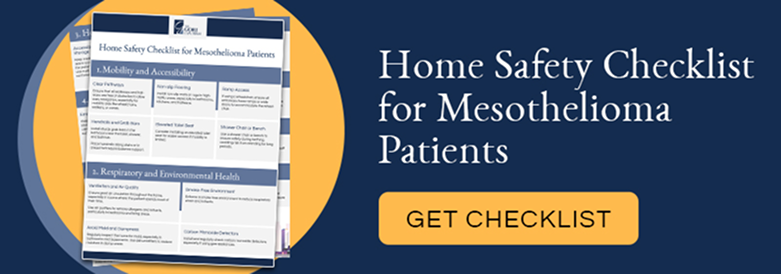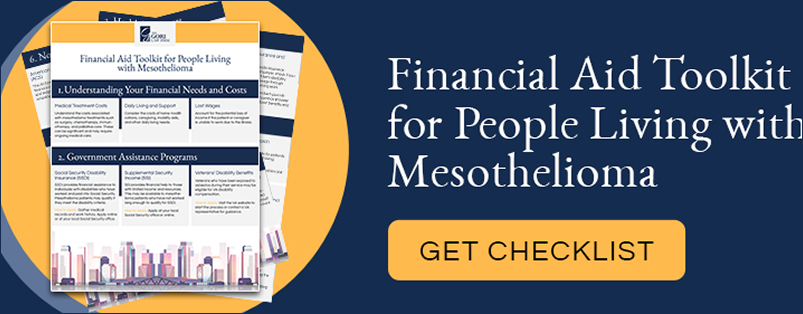The Complete Resource Hub for People Living with Mesothelioma Disabilities

Living with mesothelioma often means adapting to new physical, financial, and emotional challenges. This collection of mesothelioma disability resources provides practical guidance for patients, families, and caregivers alike.
Disabilities Caused by Mesothelioma
Mesothelioma can affect nearly every system of the body. As the disease progresses, its symptoms can lead to lasting physical and functional limitations.
Physical Disabilities
Mesothelioma typically begins in the lining of the lungs or the abdomen. Patients with cancer affecting the lungs commonly experience shortness of breath, chest pain, and a persistent cough. The symptoms can reduce stamina and limit daily tasks such as walking, climbing stairs, or carrying objects.
In abdominal mesothelioma, patients may experience abdominal pain and swelling. These changes can cause ongoing discomfort and limit mobility.
Sensory Disabilities
Some types of chemotherapy used to treat mesothelioma, such as cisplatin, can cause ringing in the ears. Some patients experience permanent hearing loss after exposure to the drug.
Mental Health Disabilities
Mesothelioma’s aggressive nature can take a serious toll on a patient’s mental health. Many people experience intense sadness, fear, frustration, or uncertainty about the future. When these symptoms persist, they may develop into depression or anxiety.
Some patients also develop post-traumatic stress disorder. The shock of diagnosis and invasive treatments can trigger intrusive thoughts, nightmares, emotional numbness, and social withdrawal.
Neurological Disabilities
Certain chemotherapy drugs may lead to peripheral neuropathy. This condition often involves numbness, tingling, or burning sensations in the hands and feet, along with balance problems or muscle weakness. These symptoms can make it harder to walk or handle objects.
Hidden Disabilities
Some of mesothelioma’s most limiting effects aren’t visible. Persistent fatigue, weakness, and pain are common among patients. These invisible disabilities can make it difficult to work, manage household tasks, or participate in social activities.
Daily Tips for People With Mesothelioma
Managing everyday activities with mesothelioma can be physically and mentally demanding. Here are some adjustments to routine tasks that can help you preserve strength and independence while reducing discomfort.
Conserve Energy
Try to plan tasks for the times when you have the most energy, and rest before you become exhausted. Break larger chores into smaller steps, and spread them throughout the day or week instead of pushing through all at once.
Schedule in naps so they become non-negotiable parts of your day. You can also make daily routines less tiring by keeping commonly used items within easy reach, sitting while cooking or showering, and using adaptive tools. If moving around takes more energy than it used to, consider using mobility aids such as a lightweight cane, walker, or wheelchair.

Ensure Proper Nutrition and Hydration
Managing mesothelioma’s nutritional effects can make it easier for your body to handle the stress of your illness and treatment. If you experience nausea, loss of appetite, or trouble swallowing, try eating small, frequent meals throughout the day instead of three large ones. Choose bland, soft, or easy-to-chew foods to make eating more comfortable.
For severe nausea, consider talking to your doctor about anti-nausea medications. If your symptoms make it difficult to get enough protein, you and your doctor may also consider adding a high-protein oral nutrition supplement to your diet.
Staying well-hydrated can further support your body’s functions. Keep a reusable water bottle within arm’s reach and take small sips often. If you have a hard time tolerating plain water, try flavored water, herbal tea, or smoothies to stay hydrated.
Manage Pain, Discomfort, and Emotional Well-Being
If your pain interferes with your quality of life, speak with your doctor about medication options. You can also take pain relief measures at home, including applying a warm compress to sore muscles or joints and engaging in gentle stretching.
Using a supportive chair or cushion may make it easier to rest without strain. When breathing becomes uncomfortable, try sitting upright or propping your upper body on extra pillows to ease pressure on the lungs.
Emotional well-being is an essential part of symptom management. Spend time with loved ones, listen to calming music, or practice breathing exercises to relax your body and mind. If mental health symptoms become overwhelming, join a support group or talk with a therapist who specializes in providing mesothelioma support for disabled individuals.

Home Safety Checklist for Mesothelioma Patients
A few thoughtful changes to your home can make daily life safer and more comfortable while undergoing mesothelioma treatment.
Mobility & Accessibility
Wide, clutter-free pathways reduce the risk of falls for mesothelioma patients dealing with muscle weakness or balance problems. Consider adding grab bars and non-slip flooring in high-risk areas, such as the bathroom.
Install plenty of lighting throughout the home to further prevent falls. Motion sensor lights can make it safer for the patient to get around at night.
Adaptive tools, such as grabbers, shower chairs, and adjustable furniture, can make daily tasks less tiring. You may want to install an elevated toilet seat to make sitting and standing less strenuous. If the patient uses a wheelchair or has trouble climbing stairs, adding a ramp to your entryway can increase accessibility. It may also help to arrange furniture so the patient can move across rooms in a direct path and conserve energy throughout the day.
Health and Treatment
Keep medications in an easy-to-reach place, ideally near where the patient spends most of their time. A labeled pill organizer can help prevent missed or doubled doses.
Store oxygen tanks, nebulizers, and other medical devices within easy reach but out of walkways to reduce tripping hazards. Properly secure oxygen tanks to prevent them from tipping over.
To make breathing easier, maintain good air circulation and avoid irritants such as smoke, dust, and strong fragrances. Regularly check the home for mold, and use dehumidifiers in damp areas.
Designate a quiet, comfortable area for rest—preferably a reclining chair—when the patient experiences fatigue or shortness of breath.


Emergency Preparedness
Display an updated list of emergency contacts, including doctors, caregivers, and family members, in a central location in your home. Additionally, you’ll want to keep a well-stocked first aid kit in an accessible spot. Include basic supplies such as bandages, antiseptics, over-the-counter medications, and other items specific to mesothelioma care.
Install smoke detectors and carbon monoxide detectors in every bedroom and hallway, and test them monthly to make sure they work properly. Keep a fire extinguisher within easy reach, and make sure everyone in the home knows the fastest way to exit in an emergency.
Assistance and Caregiver Support
Caring for someone with mesothelioma often requires planning, patience, and a strong support network. Family members and friends can take turns helping the patient with specific tasks, such as driving to appointments, preparing meals, or managing insurance paperwork.
Help from home health aides can ease the load on loved ones by providing professional medical support and giving caregivers time to rest and recharge. Setting aside a small, comfortable area where caregivers can rest can also help to prevent burnout.
Keep communication tools, such as an intercom or alert system, close to where the patient spends most of their time in the home. This allows them to easily reach caregivers when needed while supporting the patient’s autonomy.
Financial and Legal Support Resources
Treatment costs, missed work, and the need for ongoing care after a mesothelioma diagnosis can significantly strain a family’s finances. Many patients face additional stress when pursuing compensation from the companies responsible for their asbestos exposure. Fortunately, many mesothelioma disability resources are available to address these challenges.

Disability Benefits and Compensation
Advanced cancer often makes it impossible to continue working, but mesothelioma disability benefits can replace lost income. The Social Security Administration lists cancers such as malignant mesothelioma as a qualifying condition for both Social Security Disability Insurance and Supplemental Security Income. Because the disease is severe, most applicants qualify for the Compassionate Allowances program, which fast-tracks the mesothelioma disability claims process.
Veterans who developed mesothelioma due to asbestos exposure during their military service may also qualify for VA disability compensation. The Department of Veterans Affairs usually assigns mesothelioma a 100 percent disability rating, which entitles eligible veterans to the maximum monthly benefit and comprehensive VA health care.
Legal Resources for Mesothelioma Claims
Because asbestos exposure is the only known cause of mesothelioma, many cases can be traced back to specific products, job sites, or companies that failed to protect workers or consumers from exposure. As a result, individuals diagnosed with mesothelioma often have legal rights to pursue compensation from those responsible. This mesothelioma disability compensation can cover the significant costs that come with the disease.
Asbestos trust funds are one common source of relief for mesothelioma patients. These funds were established to make sure future victims could still receive compensation after asbestos manufacturers filed for bankruptcy. Filing a trust fund claim usually doesn’t require going to court and can be completed by submitting medical and exposure records with help from a lawyer.
Those who do not qualify for trust fund compensation may work with an attorney to pursue personal injury or wrongful death claims against the responsible companies. Lawyers who provide mesothelioma legal assistance for disabled patients usually work on a contingency fee basis. That means it costs nothing out of pocket to seek this compensation.
Mental Health and Emotional Support
The stress of ongoing treatment, uncertainty about the future, and disruptions to daily life can create emotional distress for mesothelioma patients. Mental health resources can help patients better navigate these challenges.
Counseling and Therapy Services
Speaking with a licensed therapist experienced in supporting cancer patients can provide a safe space to work through fear or grief. Cognitive behavioral therapy is particularly effective in addressing negative thought patterns and helping patients build resilience. Family counseling can also strengthen communication and understanding between loved ones.
Online therapy platforms such as BetterHelp and Talkspace connect patients with licensed professionals through messaging or video sessions. Many private practices also provide virtual appointments. This flexibility is often vital for people living with mesothelioma, whose symptoms and treatment schedules can make it difficult to attend regular in-person appointments.
Support Groups and Community Networks
Hospitals and cancer centers often offer in-person support groups for patients. Sharing experiences with others who understand mesothelioma firsthand can ease feelings of isolation.
Online communities such as CancerCare’s support groups also allow participation at home. Organizations such as the Mesothelioma Applied Research Foundation provide one-on-one peer support for patients seeking connection with survivors who understand their journey.




